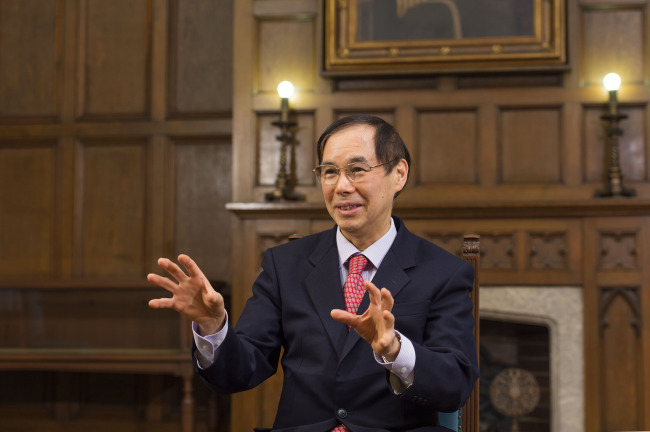그는 또 중국 금융시장의 폐쇄적인 측면이 한국과 일본의 통화시장 불안요소로 작용하고 있다고 지적했다. 미국의 양적완화 정책으로 늘어난 통화량 중 상당 수는 중국 금융시장의 폐쇄적인 측면으로 인해 중국 대신 한국과 일본으로 몰렸다는 것이다.
통화 불안요소를 해결하기 위해서라도, “한국과 일본은 중국이 자본시장을 완전히 개방하도록 설득해야 한다”고 덧붙였다.
요시노 교수는 일본의 대표적인 ‘아베노믹스’ 전문가로 최근까지도 일본 정부의 경제자문역으로 활동했으며, 지난 4월 아시아개발은행연구소(ADBI) 소장으로 취임해 활동하고 있다.
<관련 영문 기사>
What Korea can learn from Japan’s lost decade‘Korean economy in need of structural reforms,’ says senior Japanese economist
South Korea can avoid possible economic risks by seeking to gradually transform its economy through structural reforms, rather than depending solely on monetary policies, according to a senior Japanese economist.
Such is the lesson that Korea can learn from Japan, despite their complicated historical ties, said Naoyuki Yoshino, professor of economics at Keio University, in a recent telephone interview with The Korea Herald.
“Korea can learn from Japan’s mistakes in the past,” he said from Tokyo, where he now heads the Asian Development Bank Institute, a policy-oriented think tank focused on development issues in the Asia-Pacific region.
According to Yoshino, Japan’s lost decade -- from 1992 to 2002 -- was the result of policy errors which could have been avoided.
“Japan made a mistake 20 years ago by taking too much heed of the economic theory relying on monetary policies to change the course of the economy,” he said.
Printing more and spending more money, however, was not enough to solve the structural problems embedded in the Japanese economy, such as the aging population and a lack of innovative start-ups.
“Based on Japan’s experience, (Korea) should not just depend on monetary policy … Only structural reforms could solve structural problems,” he said.
“Korea’s structural problems may be similar (to Japan’s) but (they are) somewhat different. Korea has to discuss and find what kinds of structural reform may be needed,” he added.
Yoshino was appointed in April as the new dean of ADBI. Previously, he was involved in a wide range of government policymaking projects while serving as chairperson of the Japanese finance ministry’s council on foreign exchange as well as its fiscal system council. He also served until recently as president of Financial System Council.
There are growing concerns here about the local currency as the won’s ascent against the dollar has been accelerating, spawning worries it could destabilize the financial market and pose potential risks to the overall economy.
The expert in foreign exchange noted that fluctuations in local currency in Japan and South Korea are due partly to China’s closed-capital market.
Between 2010 through 2013, the U.S Fed’s monetary easing policy encouraged massive amounts of foreign capital into Korea and Japan, which resulted in local currency fluctuation, he pointed out.
“But if China opened its capital market that money would have gone to China,” he said.
To reduce the risk, Korea and Japan together should urge Beijing to float China’s yuan.
“Korea and Japan should encourage China to open its capital market,” he added.
By Oh Kyu-wook (
596story@heraldcorp.com)








